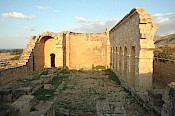Cyrenaica, part 6: Synesius of Cyrene
 He is one of the most interesting authors from Antiquity: a philosopher, an aristocrat, a traveler, a sophist, a soldier, a bishop, and a descendant of the royal house of Sparta – or so he said. He was also a genuinely kind man. He left a considerable oeuvre of six essays, ten hymns, three speeches, two sermons, 158 letters. But nobody reads it. I am referring to Synesius of Cyrene.
He is one of the most interesting authors from Antiquity: a philosopher, an aristocrat, a traveler, a sophist, a soldier, a bishop, and a descendant of the royal house of Sparta – or so he said. He was also a genuinely kind man. He left a considerable oeuvre of six essays, ten hymns, three speeches, two sermons, 158 letters. But nobody reads it. I am referring to Synesius of Cyrene.
From his essays and letters, we know a lot about his life. As the son of a very wealthy family, he was able to travel. He must have been some twenty years old when he visited Greece, where he seems to have been inaugurated in the Mysteries of Eleusis, shortly before the Emperor Theodosius put an end to this pagan cult (392). Returning to Africa, Synesius settled in Alexandria, where he was one of the students of the famous philosopher and mathematician Hypatia. Even as an old man, Synesius would refer to her as the philosopher: to him, there was only one who really mattered.
In 397, he returned to Cyrene. It may have been on this occasion that he survived the shipwreck mentioned in the exciting Letter 4. He tells about his life in the Cyrenaica:
I am studying philosophy, mathematics, astronomy, everything; I am farming, hunting, having many a brush with hordes of pilfering Libyans; and every now and then upholding the cause of someone who has undeservedly fallen into difficulties.
We know that in these years, he also composed some hymns about the beauty of the universe and an essay On dreams. In other words: Synesius acted like a Greek or Roman gentleman. This included, however, official responsibilities, which brought him to Constantinople, where he asked the emperor Arcadius to lower the taxes. In the preceding years, Cyrene had suffered too much from the “hordes of pilfering Libyans”.
His speech about the taxes is lost, but he also wrote a speech On Imperial Rule, in which he says that an emperor must fight corruption and ought not to depend on Germanic troops. If Synesius has really delivered this speech, which is in fact almost insulting to the addressee, he was lucky to survive. Maybe he was a pawn in a larger game in which the praetorian prefect Aurelian tried to sideline other court factions.
However this may be, Synesius traveled home, visiting Athens and Alexandria, where he married. (Like his contemporary Augustine of Hippo, he never mentions the name of his lover.) It is interesting that the ceremony was performed by the patriarch of Alexandria, Theophilus: we know him as a Christian hardliner who can hardly have appreciated Synesius’ pagan sympathies.
The couple settled in Cyrene, but it was no longer a safe area. The “hordes of pilfering Libyans” were again attacking the region. Synesius raised a private army and defeated the invaders on several occasions, but could not prevent his country estate from being pillaged. Still he managed to write treatises On Dio Chysostom and On an astrolabe, the world’s first roman à clef (The Egyptian Tale, about his adventures in Constantinople), and a funny speech In Praise of Baldness.
In 409, he was invited to become bishop of Ptolemais, the main Cristian center in the Cyrenaica. It was an honorable request and besides, this office suited both Synesius’ capacities and his feeling that, as an aristocrat, he had to serve the community. He was in some doubt, however, and announced that he would not dismiss his wife, but in the end accepted the offer. One of his sermons betrays that his heart was not really in it: he warns his flock against drunkenness, arguing that it is against philosophical reason, and quoting scriptural evidence only as an afterthought. We may wonder what Patriarch Theophilus thought of it.
Still, his letters show how Synesius dealt with Arianism, sought advice from others, built a monastery, announced the Easter date, acted as a judge in ecclesiastical affairs, and had a quarrel with the military leader of the Cyrenaica, Andronicus, who had violated an asylum and was excommunicated after a speech by Synesius. If Theophilus had had any doubts about Synesius, he must have been relieved to learn that the bishop of Ptolemais did his job well.
In later years, Synesius often cooperated with Anysius, a Roman commander who defeated the nomads in 411. However, they returned, and in Letter 73 we read how Synesius calls for renewed military intervention. His Catastasis is a lament on the devastation of the Cyrenaica. Contact with Alexandria was now almost impossible: the two final letters, addressed to Hypatia, are desperate. When the news arrived that Hypatia had been lynched by a Christian mob (415), Synesius was already dead – shattered by the destruction of his land and the death of his three sons.
He’s an interesting man, with a life that started optimistic and ended in a tragedy. It’s the story of the fall of the Roman Empire in a nutshell. He deserves to be read.

